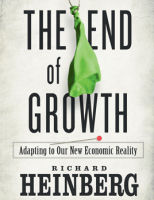 Kelvin Thomson MP will be chairing Richard Heinberg's talk about his book, The End of Growth 7.30pm. on Saturday 22 September 2012 at The Wheeler Centre, 176 Little Lonsdale Street. Heinberg is a well-known peak oil blogger and writer who delivers an entertaining and stimulating message on the serious subject of resource depletion which Australian governments and development and financial planners at all levels simply cannot cope with. At a time when Australia continues to back military intervention in the oil-rich Middle East, Richard's talk is especially topical. As well as that, it is the reality we all must deal with. So go along and then take the message back to your state and federal political representative and your growth-obsessed local council.
Kelvin Thomson MP will be chairing Richard Heinberg's talk about his book, The End of Growth 7.30pm. on Saturday 22 September 2012 at The Wheeler Centre, 176 Little Lonsdale Street. Heinberg is a well-known peak oil blogger and writer who delivers an entertaining and stimulating message on the serious subject of resource depletion which Australian governments and development and financial planners at all levels simply cannot cope with. At a time when Australia continues to back military intervention in the oil-rich Middle East, Richard's talk is especially topical. As well as that, it is the reality we all must deal with. So go along and then take the message back to your state and federal political representative and your growth-obsessed local council.

Let's hear it for the End of Growth
Senior Fellow at America’s Post Carbon Institute, Richard Heinberg, will be in Melbourne on Saturday 22 September as part of his national speaking tour on how to shape the economy of the future.
Mr Heinberg, who has written extensively on peak oil, will speak to his latest book “The End of Growth”.
“Economies cannot grow forever, even if they are based on renewable energy. We must adjust to the fact that our own civilisation has reached limits with regard to population, water, soil, raw materials, and energy,” said Mr Heinberg.
Sustainable Population Australia (SPA) is hosting his national tour, and in Melbourne they are joined by The Australian Conservation Foundation (ACF) and the Centre for the Advancement of the Steady State Economy (CASSE). The evening will be chaired by Kelvin Thomson MP, Federal Member for Wills and well known campaigner on population issues.
Good to see that Kelvin Thomson, one of very few politicians in this country who seems to 'get it' is chairing. Well done Jill Quirk, Jenny Warfe and Vivian Ortega for getting this up in Melbourne!
Victorian/Tasmanian branch president of SPA, Jill Quirk, said it was an opportune time for Richard Heinberg to visit Melbourne.
“Melbourne’s population is growing at an alarming rate,” said Ms Quirk. “Urban growth boundaries are being extended to cope with it and green wedges violated. More and more resources are required to provide infrastructure for all the extra people yet governments are unwilling to provide them.”
Before arriving in Melbourne, Mr Heinberg will have spoken to meetings in Brisbane, the Sunshine Coast, Sydney and Canberra. After Melbourne, his speaking tour will move to Adelaide and Perth and finish at the Sydney Festival of Dangerous Ideas.
Details of the Melbourne event:
The End of Growth: Peak Oil and the Economy of the Future
7.30 pm Saturday 22 September
The Wheeler Centre, 176 Little Lonsdale Street
Chaired by Kelvin Thomson MP
$5 entry at the door. RSVP and inquiries: Jenny Warfe via Email Jenny Warfe via SPAVic

Comments
Mary (not verified)
Fri, 2012-09-21 12:35
Permalink
End of growth - an interesting concept
We humans appear to be propelling Earth into a “new normal” through soaring carbon emissions, deforestation, ocean acidification, and a laundry list of other assorted global impacts. 40 years ago The Limits to Growth, written by a group of scientists at the Massachusetts Institute of Technology and published by The Club of Rome, broke a modern taboo: it suggested that growth itself might be the problem.
Kenneth Boulding, the founder of general systems theory, thought the view that economic growth can continue forever, to be a view held only by "madmen and economists".
Richard Heinberg's latest book goes to the heart of the ongoing financial crisis, explaining how and why it occurred, and what we must do to avert the worst potential outcomes.
Richard said in an ABC interview: “We are replacing regular conventional oil – which made economic growth happening during the 20th century – with harder-to-produce, more expensive-to-produce and environmentally risky tar sands, shale oil and ultra deep water oil. The problem is that these things are slow to come online and in the meanwhile regular conventional oil is declining.”
Are humans heading to a vortex of no-return through unsustainable economic, technological and human growth? It's seems to be the case!
Add comment